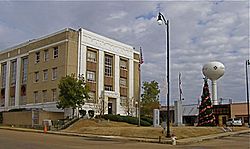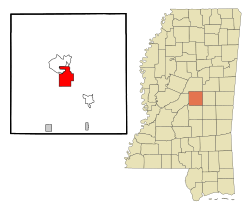Carthage, Mississippi facts for kids
Quick facts for kids
Carthage, Mississippi
|
|
|---|---|

Leake County Courthouse in Carthage, Mississippi
|
|

Location of Carthage, Mississippi
|
|
| Country | United States |
| State | Mississippi |
| County | Leake |
| Area | |
| • Total | 9.34 sq mi (24.18 km2) |
| • Land | 9.29 sq mi (24.06 km2) |
| • Water | 0.05 sq mi (0.12 km2) |
| Elevation | 351 ft (107 m) |
| Population
(2010)
|
|
| • Total | 5,075 |
| • Estimate
(2019)
|
4,782 |
| • Density | 514.69/sq mi (198.72/km2) |
| Time zone | UTC-6 (Central (CST)) |
| • Summer (DST) | UTC-5 (CDT) |
| ZIP code |
39051
|
| Area code(s) | 601 |
| FIPS code | 28-11780 |
| GNIS feature ID | 0668123 |
Carthage is a city in Leake County, Mississippi, United States. The population was 5,075 at the 2010 census. It is the county seat of Leake County.
The largest chicken processing plant in the world is located in Carthage.
Contents
History
Carthage was established in 1834, and became the county seat. The Harris family were early settlers, and named the town after their former home of Carthage, Tennessee. A courthouse and jail were built in 1836, and a post office was established the following year. Carthage was incorporated in 1876. A brick courthouse replaced the previous one in 1877, and was replaced again in 1910. The Carthaginian newspaper was established in 1872, and remains in publication today.
By 1900, agriculture was the primary industry in Leake County. The Pearl River, located 2 mi (3.2 km) south of Carthage, was used to ship goods by steamboat to and from Jackson, the state capital . Although a railroad eventually ran through Carthage, it did not play a significant role in the development of the town. In 1914, the Merrill Brothers Logging Company built a logging railroad from Canton to McAfee, passing through Carthage. The line was taken over in 1927 by the Canton and Carthage Railroad, which then established commercial service to Carthage. The railroad was abandoned in 1960.
In 1927, Jackson's Daily Clarion Ledger wrote an article entitled "Carthage is a Good Progressive and Enterprising City - Thriving Center of Leake County Holds Modern Benefits". By then, Carthage had schools, churches, an ice plant, two banks, a Masonic Hall, and a Coca-Cola bottling plant.
The population had surpassed 2,000 by 1964, and the town was reclassified as a city.
A large area known as the "Carthage Historic District", comprising commercial and residential properties of various architectural styles, is listed on the National Register of Historic Places. The post office and the Jordan House are individually listed.
When Carthage, Texas established in 1848, it was named after Carthage, Mississippi.
Civil Rights Era
As early as 1948, Carthage began holding an annual "Tri-Racial Goodwill Festival", in which all citizens were included. Although the directors of the first festival separated whites, African Americans and Native Americans, this was corrected in subsequent years. The local newspaper reported that at the 1949 festival, "friendship and goodwill fellowship permeated the air".
In 1964, a group known as Americans for the Preservation of the White Race initiated a boycott in Carthage against white-owned businesses that were complying with the Civil Rights Act. Also, when members of the Student Nonviolent Coordinating Committee tried to open a Freedom School in Carthage, local whites told them their deed was invalid, and threatened to burn the school. In 1967, shots were fired into the home of an NAACP worker in Carthage.
Geography
According to the United States Census Bureau, the city has a total area of 9.4 square miles (24 km2), of which 9.4 square miles (24 km2) is land and 0.1 square miles (0.26 km2) (0.53%) is water.
The geographic center of Mississippi is located 9 mi (14 km) west-northwest of Carthage.
Demographics
| Historical population | |||
|---|---|---|---|
| Census | Pop. | %± | |
| 1880 | 285 | — | |
| 1890 | 322 | 13.0% | |
| 1900 | 416 | 29.2% | |
| 1910 | 315 | −24.3% | |
| 1920 | 635 | 101.6% | |
| 1930 | 998 | 57.2% | |
| 1940 | 1,766 | 77.0% | |
| 1950 | 1,925 | 9.0% | |
| 1960 | 2,442 | 26.9% | |
| 1970 | 3,031 | 24.1% | |
| 1980 | 3,453 | 13.9% | |
| 1990 | 3,819 | 10.6% | |
| 2000 | 4,637 | 21.4% | |
| 2010 | 5,075 | 9.4% | |
| 2019 (est.) | 4,782 | −5.8% | |
| U.S. Decennial Census | |||
2020 census
| Race | Num. | Perc. |
|---|---|---|
| White | 1,458 | 29.75% |
| Black or African American | 2,366 | 48.28% |
| Native American | 78 | 1.59% |
| Asian | 41 | 0.84% |
| Pacific Islander | 1 | 0.02% |
| Other/Mixed | 106 | 2.16% |
| Hispanic or Latino | 851 | 17.36% |
As of the 2020 United States Census, there were 4,901 people, 1,359 households, and 1,024 families residing in the city.
Arts and culture
The Square Affair is held annually each May, and features walks, runs, a children's fishing rodeo, an idol competition, vendors, fireworks, and a basketball tournament.
Parks and recreation
McMillian Park in Carthage has baseball diamonds, tennis courts, and a fishing pond.
Lincoln Park in Carthage has a baseball diamond, basketball court, walking trail, and community center.
Economy
The largest chicken processing plant in the world—able to process 2.5 million chickens per week—is located on Highway 35 north of Carthage. Originally owned by Choctaw Maid Farms, the plant was flanked by a large trailer park built in the mid-1990s to house the factory's growing Hispanic migrant workforce, and the Hispanic population of Carthage increased from 1.9 percent to 12.3 percent between 2000 and 2010. The plant was purchased by Tyson Foods in 2003, and employs 1,700.
Education
The City of Carthage is served by the Leake County School District.
Infrastructure
Highways
Carthage is served by Mississippi Highway 35, Mississippi Highway 16, and Mississippi Highway 25.
Airport
The Carthage-Leake County Airport is located north of the city.
Law enforcement and fire
Carthage is protected by its own police and fire departments.
Notable people
- The Chambers Brothers, soul music group
- Winson Hudson, civil rights activist
- John Johnson, professional basketball player, First Team All American at University of Iowa
- Bennett Malone, member of Mississippi House of Representatives
- Marcus Mann, Southern Baptist minister and former college basketball player
- Donald Rawson (1925-2014), history professor and administrator at Northwestern State University in Natchitoches, Louisiana, born in the former Dossville in Leake County
- O'Neal Wilder, World Junior gold medalist
See also
 In Spanish: Carthage (Misisipi) para niños
In Spanish: Carthage (Misisipi) para niños


